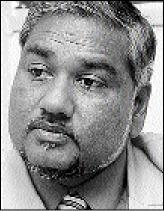
Donovan Thomas
Phyllis Thomas, Enterprise Editor
WITH THE the economic crisis a virtual noose around the necks of many Jamaicans, some persons are seeing suicide as the only way out and have, in fact, tried to end their lives.
The Ministry of Health has confirmed that 318 persons tried to kill themselves between 2007 and 2008.
The ministry did not give a breakdown of the demographic group, and did not comment on or tie the attempted suicides to the economic tempest.
However, Dr Donovan Thomas, founder and president of the suicide-intervention organisation Choose Life International, said that there was a strong link between the current crisis and some suicides or suicide attempts. The economic crisis, he said, can act as a trigger to push people over the edge, especially persons were struggling with other issues.
"In our Jamaican context, almost every week I receive at least one call from persons who have experienced financial loss and are on the verge of taking their own lives," Thomas told The Sunday Gleaner.
"It is also very likely that there are persons who have died by suicide as a response to the economic pressure or financial loss they experienced."
Hundreds of Jamaicans have lost their jobs as businesses wilt under the pressure, and some banks are carrying increased bad-debt portfolios, even as the country contemplates measures to stay afloat.
According to the Economic and Social Survey of Jamaica 2008, published by the Planning Institute of Jamaica, the unemployed labour force increased by 10.6 per cent to 137, 300 over a one-year period.
The average unemployment rate was 10.6 per cent, an increase of 0.8 percentage points relative to 2007, with the male unemployment rate being 7.3 per cent, and the female rate being 14.6 per cent.
Not only are the data revealing that more Jamaicans are attempting suicide, they are showing paradoxically, that Jamaica has had, for some time, one of the lowest suicide rates in the world.
200 suicides a year
Some countries have more than 1,000 such deaths each year, and in the region, Guyana is averaging 200 suicides a year.
But that should not provide any comfort for anyone in Jamaica. Thomas pointed out that 10 years ago, South Korea had one of the lowest suicide rates in the world and now, it is among the countries with the highest.
"As Jamaicans, we can sit back and say our suicide rate is low, or we can be proactive and respond to the signs of vulnerability of our people to suicide," Thomas, who holds a doctorate in ministry, argued.
In fact, quoting police statistics, Thomas said that up to August 23, 42 persons were recorded as having died by suicide in Jamaica this year. Of that number, 40 were men and two women.
Depression is also blamed for some of the suicide and attempted suicides here. Thomas said that in his research with Jamaicans, 93 per cent of the teenagers his organisation interviewed indicated that they felt depressed.
The National Council on Drug Abuse supplied data from the 'National Household Survey of Drug Use and Abuse in Jamaica: 2001' to support its position that there was a relationship between substance abuse and depression.
It said the rate of depression was highest among persons dependent on alcohol or illicit substances, and lowest among persons who reported that they had never used alcohol or illicit substances.
Follow The Gleaner's Positive Parenting tomorrow for the start of our serialisation of the soon-to-be-released second edition of Dr Donovan Thomas' book 'Confronting Suicide: Helping Teens at Risk'.
phyllis.thomas@gleanerjm.com
WITH SUICIDAL tendencies of concern in the country, Jamaica will join with the rest of the world in observing World Suicide Prevention Day on Thursday.
Among the activities to commemorate the day will be a seminar to be held at the Hilton hotel, organised by Choose Life International (CLI), a suicide-intervention organisation. The seminar theme is 'Confronting Suicidal Tendencies Among Jamaican Youth'.
Several health professionals are to make presentations on topics like, 'What is Suicide?', 'Causes of Suicide', 'The Process of Becoming Suicidal', 'Prevention and Intervention Strategies', and 'Unveiling the Myths About Suicide'. The seminar starts at 8 a.m.
World Suicide Prevention Day is organised by the International Association for Suicide Prevention in collaboration with the World Health Organisation (WHO).
The WHO reports that more than one million people commit suicide every year worldwide and it is one of the leading causes of death among teenagers and adults under 35. The WHO sees suicide as a major public-health problem.
Choose Life International is not about to sit and watch suicide get out of control in Jamaica. Its president and founder, Dr Donovan Thomas, said that in 1996, the Police Statistics Department started categorising child suicide separate from adult suicide. The police have created a category zero to 10 years because of the incidence of suicide even with children under age 10.
Year Number discharged
2007 135
2008 183
2008 data are provisional
Source: Ministry of Health
Over the last 40 years (1978-2008), the number of recorded suicides in Jamaica has increased by 586 per cent, from seven to 48.
The year 2000 saw 80 suicides, the highest number of recorded suicides in Jamaica in any one year.
Since the start of the year, 42 persons were recorded as having died by suicide. Forty were men and two were women.
Source: Choose Life International